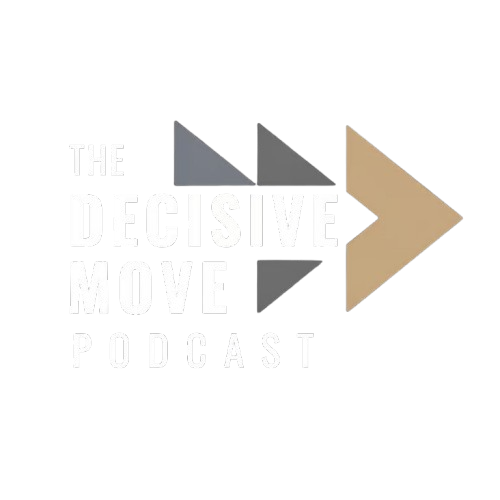Afraid to Say “I Don’t Know”? Watch This Before Faking It Again
You think you’re showing confidence. You think you’re proving your expertise. But what if all that fake-it-till-you-make-it energy is actually destroying your credibility and killing your momentum?
In this episode of The Decisive Move Podcast, Jack Trama reveals the hidden cost of pretending to have all the answers—and why three simple words (“I don’t know”) might be the most powerful phrase in your leadership toolkit.
This isn’t about admitting weakness or looking unprepared. It’s about discovering how radical honesty creates deeper trust, clearer communication, and stronger relationships than any amount of performative expertise ever could.
What You’ll Learn:
- Why “I don’t know” builds trust instead of exposing weakness
- How fake confidence quietly erodes your real credibility
- The moment Jack learned this lesson on a sales call that changed everything
- What true decisiveness looks like when you don’t have all the information
- How to practice honesty in small moments to build this critical skill
- The daily micro-practice that separates top communicators from everyone else
Resources Mentioned:
Get The Clarity You Need in 5 Minutes – 👉 https://decidity.com
Run a coaching company or sell high-trust offers? See how we help your clients work through their hesitiation: 👉 https://decisivemove.com/system
Let’s Keep the Conversation Going: What’s one situation where you recently pretended to know more than you actually did? How might honesty have changed the outcome?
Drop your reflections or tag @JackTrama on socials to share what landed. Your story might just give someone else permission to embrace their own uncertainty.
Afraid to Say “I Don’t Know”? Watch This Before Faking It Again The Decisive Move Podcast with Jack Trama
The Pressure to Always Have Answers
Ever get asked something you didn’t know and felt the pressure to answer anyway? Like if you said “I don’t know,” they’d never take you seriously again?
We’ve all been there. That instant panic when someone asks a question and you draw a blank—but instead of being honest, you start talking, hoping confidence will carry you through.
That pressure is killing your credibility more than helping it.
The Sales Call That Changed Everything
I remember a sales call early in my career. A client hit me with a curveball question, and I had no clue. But I answered anyway.
Why? Because I thought admitting I didn’t know would make me look like an amateur.
That one moment cost me trust—and that client. What I didn’t realize is that faking it was more damaging than admitting uncertainty. The client sniffed out the bluff, and from that point on, everything felt off.
We’re Conditioned to Fear Not Knowing
We’ve been trained to think that knowing is power. School, jobs, social media—we reward people who seem sure of themselves, even when they’re dead wrong.
But pretending digs a deeper hole. It locks you out of growth, curiosity, and real connection.
In many cases, clarity is the real edge—not fake confidence.
“I Don’t Know” Is Actually Powerful
Here’s what happens when you say “I don’t know”:
- It clears space. It disarms people because they don’t expect honesty—but when they get it, they listen differently.
- It builds trust. It shows you’re human and confident enough to admit limitations.
- It creates momentum. You stop wasting energy pretending and start solving with clarity.
- It speeds up progress. Honesty cuts through the noise faster than any performance.
Start Small: Practice in Low-Risk Situations
You don’t need to overhaul everything at once. Try these phrases:
- “I’m not sure—let me look into that.”
- “I don’t know yet. What are your thoughts?”
- “That’s a good question. I want to be accurate, so I don’t know right now.”
These small shifts create micro-trust. And if you’re leading others, admitting you don’t know gives your team permission to speak up, bring new ideas, and actually contribute.
App Spotlight: Decidity
When you’re stuck between options or wrestling with hesitation, Decidity is a 5-minute decision-making tool you can use on the spot. It’s not a course or mindset hack—it’s clarity you can walk away with before your coffee even cools.
Try it at decidity.com.
The Clean “I Don’t Know” Challenge
This week, say “I don’t know” at least once—then add, “But I will find out.”
Notice the reaction. Feel the difference.
It opens doors. Sometimes to deeper conversations. Sometimes to new resources or connections. But it always moves you forward.
And movement is what builds clarity.
For Coaches & Consultants: The Decision Accelerator System
If you’re tired of great calls ending with “Let me think about it…” check out The Decision Accelerator System. It helps your leads process clarity after the call—without losing momentum.
Real Talk: Honesty Is Courage
Saying “I don’t know” isn’t backing down—it’s stepping up.
In a world addicted to certainty, choosing honesty is the decisive move. It’s clarity. It’s courage.
Final Thought
If this shifted your thinking, share it with someone who needs to hear it. And for a quick hit of clarity you can use right away, sign up for The Decision Brief at decisivemove.com.
Every bold outcome starts with one honest moment.
Make yours today.







